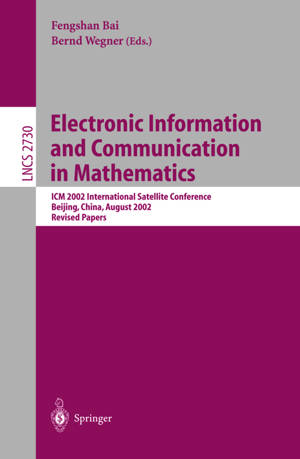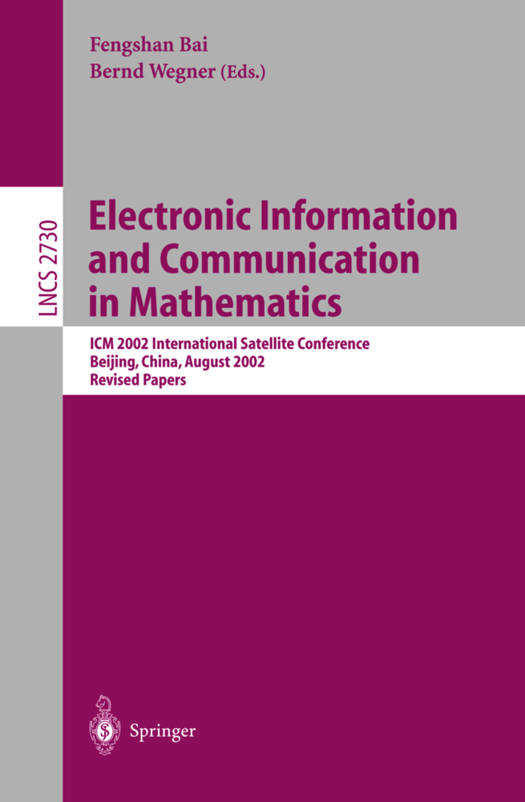
Bedankt voor het vertrouwen het afgelopen jaar! Om jou te bedanken bieden we GRATIS verzending (in België) aan op alles gedurende de hele maand januari.
- Afhalen na 1 uur in een winkel met voorraad
- In januari gratis thuislevering in België
- Ruim aanbod met 7 miljoen producten
Bedankt voor het vertrouwen het afgelopen jaar! Om jou te bedanken bieden we GRATIS verzending (in België) aan op alles gedurende de hele maand januari.
- Afhalen na 1 uur in een winkel met voorraad
- In januari gratis thuislevering in België
- Ruim aanbod met 7 miljoen producten
Zoeken
Electronic Information and Communication in Mathematics
ICM 2002 International Satellite Conference, Beijing, China, August 29-31, 2002, Revised Papers
€ 83,95
+ 167 punten
Omschrijving
At the end of August 2002 a workshop on Electronic Information and Com- nication in Mathematics took place at the Tsinghua University in Beijing. The title was "Find and Post Mathematics in the Web," we were trying to attract contributions from the most important groups worldwide, that are working on this subject. Having date and location tightly connected with the ICM 2002 (- ternational Congress of Mathematicians), organized by the IMU (International Mathematical Union) in Beijing, the workshop bene?ted signi?cantly from h- ing the ICM participants nearby. In particular it was possible to attract several members of the CEIC (Committee for Electronic Information and Communi- tion), which is an IMU committee in charge of the topic of the workshop. Hence the workshopsucceeded in giving a comprehensivesurvey on the state of the art in electronic information and communication in mathematics. The detailed topics coveredby the presentations were: models and standards forinformationandmeta-informationrepresentation;methodsandtoolsfordata search, discovery, retrieval and analysis;access to distributed and heterogeneous digital collections (interoperability, scalability, relevant information discovery, meta-information integration); intelligent user interfaces in electronic libraries, agent technologies, co-operativework on the data; advanced technologies of d- ital collection generation in mathematics; authoring tools and preparation of electronic publications in mathematics; business models for the generation and distribution of digital collections; and data security and information protection. The contributions dealt with both sides, the current practical work for the p- duction anddistribution of electronic informationin mathematics and the str- tural investigations for their management.
Specificaties
Betrokkenen
- Uitgeverij:
Inhoud
- Aantal bladzijden:
- 194
- Taal:
- Engels
- Reeks:
- Reeksnummer:
- nr. 2730
Eigenschappen
- Productcode (EAN):
- 9783540406891
- Verschijningsdatum:
- 3/09/2003
- Uitvoering:
- Paperback
- Formaat:
- Trade paperback (VS)
- Afmetingen:
- 156 mm x 234 mm
- Gewicht:
- 290 g

Alleen bij Standaard Boekhandel
+ 167 punten op je klantenkaart van Standaard Boekhandel
Beoordelingen
We publiceren alleen reviews die voldoen aan de voorwaarden voor reviews. Bekijk onze voorwaarden voor reviews.








